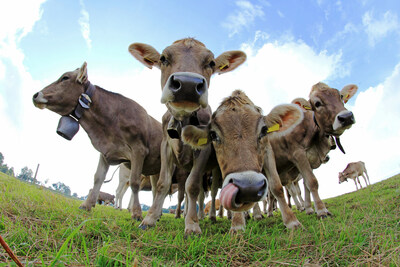Mootral’s new platform reduces methane emissions from cows by 50% and can be delivered to both housed and grazing cattle, vastly increasing the opportunity to reduce methane emissions globally
LONDON, Dec. 4, 2023 /PRNewswire/ — Mootral, a British biotech company, announces it has completed the in vitro development and testing phase and is now commencing a range of in vivo trials of its Enterix Advanced technology, set to significantly boost the methane reduction efficacy of the original Enterix™ product, while maintaining productivity benefits essential for wide-scale farmer adoption.

Enterix Advanced incorporates a patented technology that harnesses the power of iodoform, known for its methane-inhibiting properties, by synergizing it with specific active compounds from garlic. This approach builds on Mootral’s original technology, which is already in use on UK commercial farms. The key lies in the strong synergy between these compounds, allowing for significant emission reductions without impacting dry matter intake and milk yield, a potential problem previously associated with high doses of iodoform.
Mootral’s new technology allows for a controlled release formulation necessary for bolus administration in grazing cattle, vastly increasing the potential for methane mitigation in animal agriculture globally.
“A known methane suppressant, iodoform has the same mode of action as bromoform, the active ingredient in some species of seaweed proposed for methane reduction,” said Thomas Hafner, Founder and CEO of Mootral. “Critically, it is a familiar compound already approved for certain uses in human and animal health, it is non-carcinogenic, non-ozone depleting, and can be scaled easily and affordably.”
Mootral’s R&D is based on first principles of efficacy, scalability and farmer benefits. Its Enterix Advanced technology delivers all three – through significant methane reduction, applicability in both housed and grazing animals, and productivity and animal health benefits key to farmer adoption. It can also be scaled without the need for massive investments.
“Our North Star is our desire to turn animal agriculture into a climate success by improving farmer economics and benefits. We have found a solution that can be applied to any cow in any setting, while making commercial sense for the farmer and being sustainable for the planet,” said Hafner.
The opportunity to reduce methane is both urgent – the gas traps 84 times more heat than carbon dioxide – and highly strategic – its reduction can have an immediate measurable impact on climate mitigation. Methane generated from enteric fermentation during cows’ digestion accounts for nearly 30 percent of all human-induced methane emissions.
Extensive in vivo trials will take place in 2024, with the goal of obtaining regulatory approvals from late 2026. Mootral is accelerating the speed of its rollout with a plan to scale into as many as 300 million cows within the next decade.

SOURCE Mootral



















